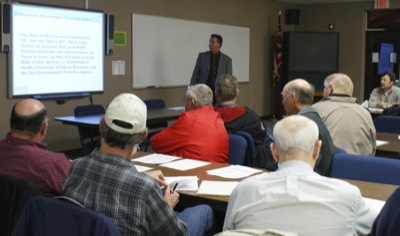Thursday, November 10th, 2011
Health board plans for levy
By Shelley Grieshop

Photo by Shelley Grieshop/The Daily Standard
Dale Palmer, administrator for the Mercer County-Celina City Health Department, speaks to township and community leaders Wednesday night about a proposed five-year, 0.6-mill levy to support health services. The health board approved placing the measure on the ballot in March.
Mercer County health board members moved forward with plans to place a countywide property tax levy on the March primary ballot.
A resolution passed 4-1 Wednesday asking for a five-year, 0.6-mill levy. The measure still needs approval of the county auditor and county commissioners before being filed with the board of elections by Dec. 7.
If approved, levy funds would take away the burden of the county's 23 political subdivisions - townships, villages and Celina - that together pay for 22 percent ($245,000 annually) of the Mercer County-Celina City Health Department budget.
The levy is estimated to bring in $530,274 annually, which represents 48 percent of the budget.
At a health board meeting with local officials Wednesday evening, some questioned the millage amount. Health board members at previous meetings talked about a 0.35-mill and then 0.4-mill levy.
"I felt the 0.4 might pass, then it was 0.6," St. Henry Mayor Jeff Mescher said. "That's going to be a tough cookie to sell. People will ask what you're doing with all that money."
Health department administrator Dale Palmer apologized for initially understating the millage but noted early estimates would not be adequate or provide essential carry-over dollars each year.
"We don't want to come back in three years and ask for more," he said.
Health board member George Moore, who cast the sole "no" vote, shared the same concerns as some local officials.
Moore this morning said the health department needs to be funded and "a levy is the way to go."
"But I'm just not sure that the 0.6 mill is the best way to do it," he said.
The levy proposal arose after township trustees voiced concern about paying their health department fee due to government funding cuts of 25 percent in 2012 and 2013.
Palmer told county officials he had only a brief time-frame to analyze financial needs and expenses for the next six years so the issue could be voted on in March.
Several of the two dozen representatives in the crowd appeared hesitant but agreed a countywide levy was better than individual levies in each township. They used the proposed 1-mill operating levy for Marion Township, which failed at the polls Tuesday, as an example.
Dale Boeckman, a Washington Township trustee, asked Palmer if the health department is raising fees adequately to help off-set its costs. Boeckman said the burden shouldn't fall to the people who don't use the services.
Palmer said fees are adjusted to stay in-line with like-sized counties and more efficient billing methods are being explored.
Services provided by the local health department include immunizations, sewer/septic, well, landfill and food service inspections, nursing services, water sample testing and vital statistics.
It also was suggested that the tax levy be based on income, not property. Officials said it may be too complex but vowed to look into the idea.
Don Stachler, a trustee for Liberty Township, asked what the plan was if the levy fails. Palmer told him the funding obligation would continue for the political subdivisions.
"So our costs could go up?" Stachler said.
Palmer replied "yes."
Another trustee asked if there was a limit to the amount the health department could charge them each year, and Palmer explained it was based on valuations.
Of the $245,000 the department collects from the subdivisions, the city of Celina pays 22 percent ($54,101) per an agreement penned in 1953. The townships and corporations (cities/villages) pay the remaining 78 percent. The individual payments are figured by taking total property valuation, divided by the valuation of all townships and corporations (currently $633,240,220).
The cut in local government funding is squeezing the budgets of several townships. For example, Jefferson Township received $16,000 this year but will get only $11,215 in 2012 and will owe the health department $20,519.
The county dispersed $1.9 million in local government funds in 2011. The funds are expected to dwindle to $1.3 million in 2012 and $929,000 in 2013, according to auditor Randy Grapner.
Forty-three percent of the local government funds are kept by the county, 39 percent is retained by the corporations/villages and 18 percent is shared by the townships, as approved by the county's budget commission.
Other funding sources for the townships are auto registration fees and various taxes such as excise, gasoline and levies. Income from estate taxes and tangible personal property taxes are being eliminated per changes at the state level.
Health board members admitted they weren't excited about placing a tax levy on the ballot but feel it's necessary to maintain their services.
"We're not in the levy business ... this is new to us, too," board president Dr. Ed Hosbach said.
Health commissioner Dr. Philip Masser said he's proud of the work and frugality shown by the health department. Its role has changed dramatically in recent years with bio-terrorism, pandemics and disaster planning, he said.
"It's a different ballgame today," he added.
If the levy passes March 6, a resident with property valued at $100,000 would pay $18.38 per year.

